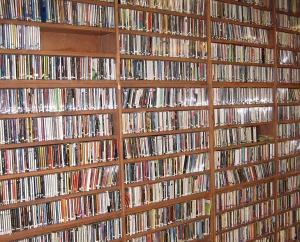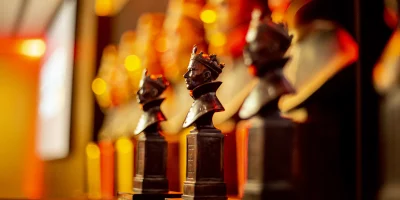
In Praise of Cast Recordings
To any musical theatre fan cast recordings are a vital part of their every day life. I can confess collecting cast recordings is a hobby for me that teeters on the edge of obsession. I own well over 300 recordings, a number that continually threatens the confines of my CD shelf and will one day see me on an ITV 'real lives' style show as I'm found dead in my flat, crushed by plastic cases.
In a life that frighteningly echoes that of Drowsy's 'Man in the Chair', I find nothing better helps me get through my working day than listening to whichever shows happen to take my fancy. When the sun shines, I enjoy the brassy belts of Jerry Herman - and on a rainy afternoon there's nothing better than a bit of Adam Guettel or a spot of Sondheim. When the clock hits four it's usually time for a swift gin and a sing-along to anything with a heavy belt, but that's perhaps too much information.
The beauty of collecting physical CD's is that so many are available very cheaply - thanks to Ebay and Amazon marketplace and the fact that so few people want to keep CD's in this 'digital age'. Call me old fashioned, but I hate the idea of my music being confined to iTunes alone. As much as I love my iPod classic, with its 15,000+ songs and barely half full, I relish holding the actual CD in my hand. With cast recordings in particular the joy of seeing the artwork and reading the linear notes is one that that will always turn me off digital buying.
Another obsession is with flop musicals. Those gems of shows that run for less than a week and are totally forgotten, but contain within them a number of hits that help you latch onto a score and enjoy it in its entirely. In some cases a flop is so bad the recording reflects the fact, but rather than allow it to be forgotten the recording keeps its spirit alive in some form.
On Broadway there is a much higher demand for cast recordings, and so almost every new show (and often revival) commands one, whereas London is quite different. Recordings are vital for future audiences to discover shows, and composers recognise this potential especially as they hope for their work to be picked up by the major licensors such as MTI or Tams Witmark. There are glorious stories of shows such as 'Anyone Can Whistle' and 'Merrily We Roll Along' (both fantastic flops on their first outings) being recorded simply to preserve that moment in time - and in both cases have allowed the shows to go on to achieve greater success in later life.
Recording a cast album however is expensive, and the economic boundary is by far the biggest hurdle. I recently learned that Actors Equity in America demands that a cast get paid a whole weeks wage per DAY of recording - which in a large ensemble driven show soon adds up. Factor into that the orchestra or band (who are more often than not expanded for the purpose of recording), the sound technicians, the musical supervisors etc etc and you have a large bill on your hands.
I was delighted to find out that the Chichester Festival Theatre's production of Gypsy had been recorded, at Angel Studios no less, meaning Imelda and co.'s triumphant performance will live on, in some form, for ever. Despite multiple recordings of the show being available (I'm not ashamed to say I currently own seven recordings of the show), it's important that each production gets preserved in its own way, and after hearing first hand about the level of detail that went in to the recording, from the authentic period piano to the special drum skins used, I cannot wait to add this to my collection.
Producing a cast album is a feat of creativity and engineering in itself. Deciding exactly what to record, what to cut, how to blend text and move from one song to the next is carefully plotted and planned in order to give listeners the most authentic 'sense' of the production as a whole. It's not simply a case of starting at the beginning and recording everything as it comes.
The trend in London currently is for 'live' recordings, which obviously has advantages and disadvantages. For the Producer, it saves the huge cost of studio time, extra work hours etc and also allows for a really authentic representation of the show as it was, rather than augment the recording with additional musicians and singers that can then present an unrealistic feel of the show. With technology so advanced, live recordings are a great way of ensuring the spirit of the show lives on - 'Memphis', 'Made in Dagenham' and 'Miss Saigon' are three current shows that have gone down this route.
For every show that did get recorded, there are countless others that didn't. There are even those that got recorded then never released (I'm looking at you Elton...), but for cast recording collectors the thrill is in finding the rare hidden gem from decades past.
Now excuse me, I'm off to listen to the London recording of 'La Cava'...
Dom O'Hanlon
Editor at Londontheatre.co.uk & NewYorktheatreguide.com
Originally published on









